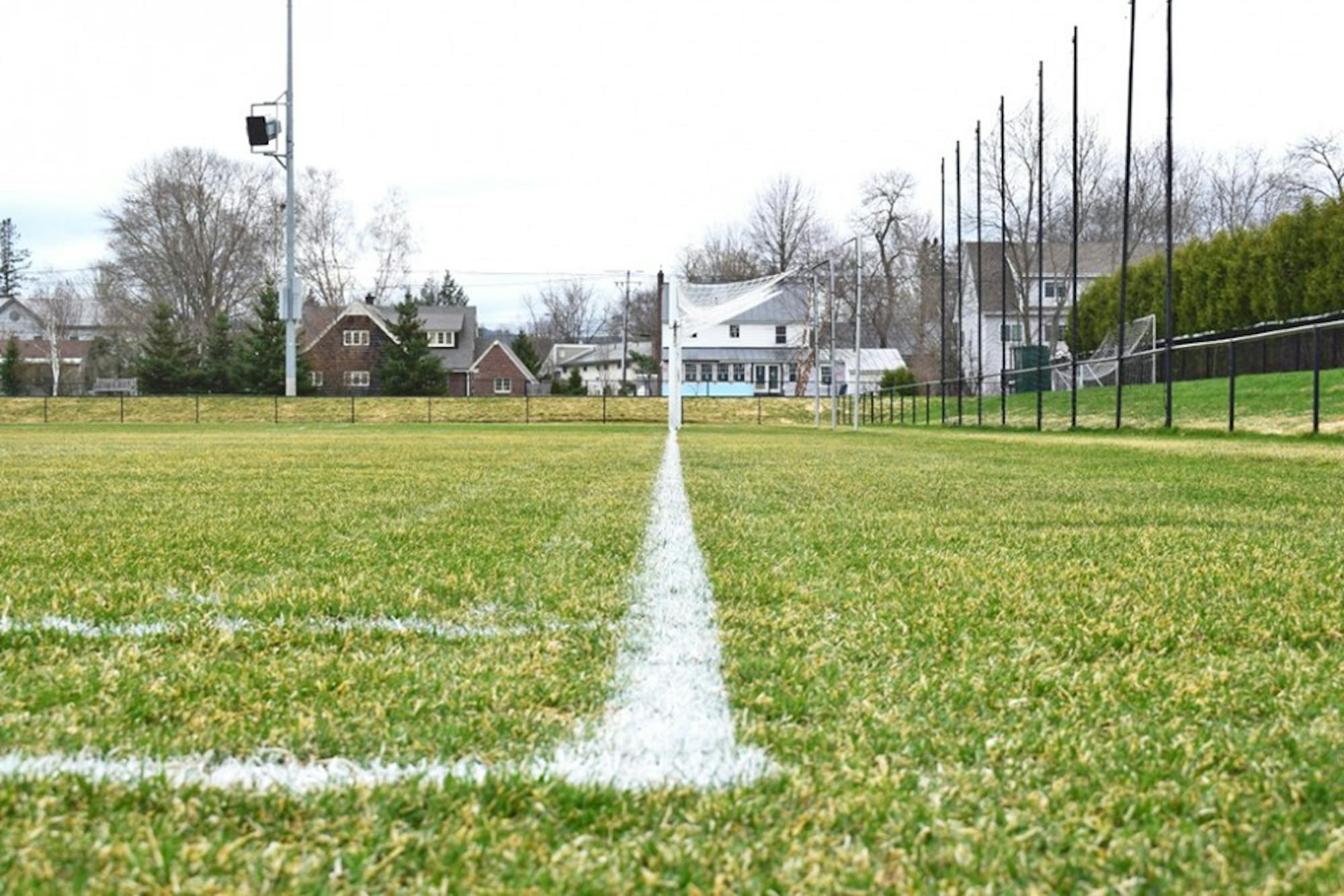Behind Burnham Field’s pristine green grass and Memorial Field’s resilient FieldTurf surface are Dartmouth sports’ turf managers, who ensure the fields are among the finest in the Ivy League. However, after three years at the College, one of the turf managers, Mike Wade, left Dartmouth for Keene State College to pursue his startup idea for technology to aerate and maintain high-end sports fields. Wade’s last day at the College was April 14.
“I live in Keene, so the commute to Dartmouth was very long for me,” Wade said. “However, I leave Dartmouth because an opportunity in Keene came about for me, and I didn’t want to pass it up.”
Wade entered the Dartmouth Entrepreneurial Network’s Pitch contest in March and left with second prize, $1,500 cash and a provisional patent for his idea, a horizontal aerator for athletic turf. Aeration involves perforating the soil with small holes to allow air, water and nutrients to penetrate the grass roots, developing a healthy root system that is resilient enough to withstand tough plays on the field.
“Several fields cannot take that kind of abuse without getting bare spots throughout the field,” Wade said.
Wade hopes that his technology will help turf managers and athletic departments save time and money tending for fields.
“The machine we have developed ... affects a greater percentage of the surface area that you are trying to impact,” he said.
Wade plans to use his prize money to purchase materials to build a prototype and test it.
“It will be tested this summer and hopefully be useful for recreation,” he said.
Aerating and grooming the athletic fields were among Wade’s responsibilities as turf manager, along with mowing the fields to a certain height and feeding the grass with nutrients. This job requires careful and delicate maintenance, which can be difficult to coordinate with varsity and club teams that need to use the fields. Dartmouth’s turf managers work with coaches and athletics staff to plan their work between practices, games and camps.
“We do a lot of aeration with a machine to reduce the density of the field and allow the field to have the ability to drain water and air out,” John Buck, another turf manager, said. “Depending on what the coach decides or desires, we can add other features to accommodate playing for teams.”
Wade was individually responsible for the maintenance of Burnham Field and Blackman Fields, which are used by the soccer and football teams, respectively.
In previous years, by the time the football team returned in the summer to start training for the season, Blackman Fields would be covered with bare spots and would lack ruggedness and durability. But Wade resolved the issue by employing a new irrigation system.
“We really worked on the system so we could use more technology to reduce the amount of water to allow the grass to grow a little better and make the field longer-lasting for the athletes,” he said.
Since then, the fields have stayed noticeably more fecund and resilient.
“Prior to [Wade] stepping in, I think the athletics staff was convinced that there was no way you could get through a soccer season without bare spots on the field,” Buck said. “[Wade] has shown that that is not the case.”
In addition to the grass fields, Buck and Wade were in charge of Dartmouth’s FieldTurf and Astroturf surfaces, including Memorial Field, Scully-Fahey Field, Red Rolfe Field and Dartmouth Park. These fields, which average a 10-year lifespan, need occasional buffering to prevent from getting tough and matted.
Memorial Field had a grass surface for decades before its renovation between 2005 and 2007, when FieldTurf was installed.
“[Natural grass] proved to be very problematic,” football head coach Buddy Teevens ’79 said. “It wouldn’t dry out fast enough, it was costly to maintain and we were struggling to find places to practice. With the onset of the FieldTurf, we can go any time, any place.”
Wade’s work impacts not only the appearance and performance of Dartmouth’s playing surfaces but also the health of the athletes.
“We found that our kickers would kick at a certain spot, and we found a depression there,” Teevens said. “That becomes a site for an athlete to get injured, but Wade [was] able to see this and make the necessary reformations to prevent injuries.”
The switch to a synthetic surface has allowed athletes to play full force with decreased risk of injury.
“Concussive head injuries are a real issue with our sport and in the various collisions that occur on the field,” Teevens said. “We have sensors that can read significant hits, and they seem to be dropping significantly. Most of the force is now being absorbed in the turf.”
Men’s soccer head coach Chad Riley wrote in an email statement that Wade’s work at Burnham Field has been highly received by the soccer team. “[Wade] has done a great job with our stadium field as well as the training fields we use,” Riley wrote. “We have the best fields in our league and in this region.”
Wade is looking forward to pursuing his horizontal aeration idea in Keene but is confident that Dartmouth’s athletic fields will remain pristine.
“The men I work with take a lot of pride in what they do, so I imagine that the fields are going to last for a really long time,” he said.




